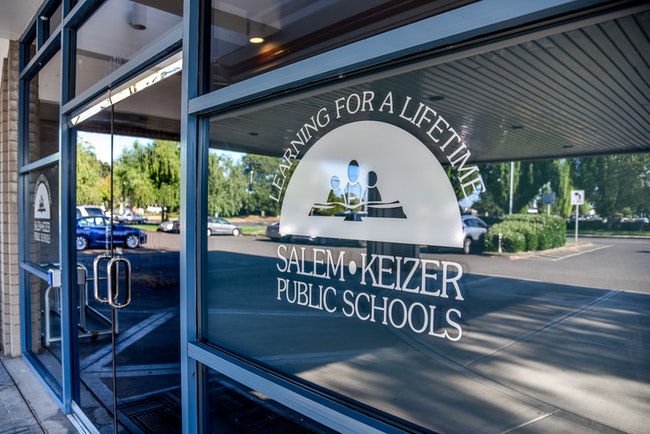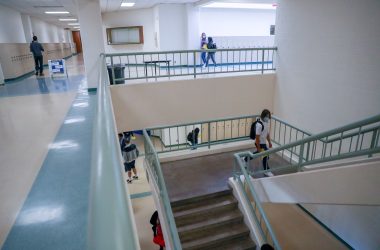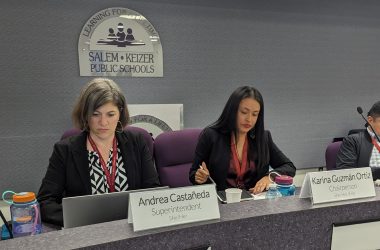
Salem-Keizer Superintendent Christy Perry surprised her own school board and some members of the public Tuesday night when she announced the end of the district’s school resource officer program.
But the district will keep in place a newer contract with the Keizer Police Department to pay for a police officer to help assess threats against students and schools and participate in risk assessments.
District officials and the Keizer City Council inked the agreement in February as discussions about the future of police in schools were ongoing.
It calls for one full-time officer to serve on the district’s Safety and Support Response Team through the end of June, with the costs split between the City of Keizer and the district. The district’s share of the cost is $59,000.
Future agreements about the handling of child abuse investigations are also possible, though the district is “committed that there is not a regular presence of law enforcement in our schools,” district spokeswoman Sylvia McDaniel said.
Mike Wolfe, Salem-Keizer’s chief operations officer, said the work outlined in the contract was previously among the duties of assigned school resource officers, who were also tasked with having a physical presence inside school buildings, mentoring students and conducting child abuse investigations.
Those responsibilities often left officers spread thin and meant no one person was responsible for helping evaluate potential risks and threats, Wolfe said.
Such assessments are outside the scope of what school resource officers typically do, so Wolfe said separating those duties into a new contract made sense.
“The contract is new but the work that law enforcement is doing in the contract isn’t,” he said.
Wolfe said the district still needed law enforcement help participating in threat and suicide risk assessments, even with schools online.
“We’re still very concerned about our students, so we still needed to support these efforts and we didn’t have any contractual agreement in place with law enforcement to do that work,” Wolfe said.
He gave as an example the rape and death threats against specific students and employees at South Salem High School posted on Instagram in December, first reported by student newspaper the Clypian. An investigation determined the person making the threats was overseas and not an imminent danger to the school, but Wolfe said the district needed law enforcement help to assess the situation.
“They’re not all that tricky, but when they do get that tricky, we need to make sure we’ve got the right resources in place and that’s what this,” Wolfe said.
He said in general, the contracted officer won’t have direct contact with students or be a presence inside schools.
Before the start of the school year, Perry suspended agreements that had placed 11 officers from the Salem and Keizer police departments and Marion County Sheriff’s Office in middle and high schools across the district, saying that service wasn’t needed with schools conducting classes online. She pledged to reevaluate the program’s future in response to calls from local activists, particularly Latinos Unidos Siempre, to end the presence of police in schools.
Latinos Unidos Siempre members celebrated Perry’s decision Tuesday, but said they would continue pushing for “truly police free” schools.
“Deeply entrenched systemic racism never shifts towards justice on its own. This victory is a testament to the power of grassroots community organizing and the power of Black and Brown young people everywhere,” the group said in a statement.
They reiterated a call to invest money that had been spent on contracts with police to services supporting students of color, including counselors and educators.
“I can now say that my peers and I will feel a little safer in schools. But we need to end the entire system of policing. This includes having any interaction with law enforcement. For years we have been advocating to end the school to prison pipeline and the removal of police from schools. But there’s so much more. For example, we need more teachers of color with our same backgrounds,” said Alondra Sanchez, a high school student and Latinos Unidos Siempre member, in a statement.
In her remarks Tuesday, Perry said her decision didn’t mean the end of any district relationship with law enforcement agencies.
“I do believe that a healthy and safe school system requires relationships with law enforcement particularly to support child abuse investigations, threat assessments, emergency response, and other key functions as long as that relationship with law enforcement is balanced with creating schools where all students feel safe and have a strong sense of belonging,” she said.
Keizer Police Chief John Teague said former school resource Officer David Zavala, who was stationed at McNary High School, is currently filling the role on the school safety team under the contract.
The future of other duties previously handled by school resource officers, particularly child abuse investigations, remains to be determined.
“It is way too early to tell, and I would do a disservice to the process if I guessed,” Teague said.
Those investigations took about 40% of officers’ time.
Teague said for now, child abuse investigations will be handled by officers as they come in. He said there are benefits to having officers in schools because students being abused are more likely to report to an officer they know.
“It is what it is, and we need to deal with it professionally and let it play out and hope it plays out in a way that’s safer for the kids in the schools,” he said of Perry’s decision.
Alison Kelley, executive director of Liberty House, a child abuse assessment center in Salem, said their office has seen “many more cases of very severe physical and sexual injuries to children” in 2020 compared to 2019. She attributed that to the stresses of the pandemic, including isolation, job loss and economic instability.
Kelley hasn’t been involved in conversations about police in local schools to date and said she didn’t want to second-guess the decision. But she wants to see community groups, the district and law enforcement ensure schools have people able to respond to reports of child abuse, recognizing that some abusers threaten children with physical harm if they report.
“If the school district is ending that arrangement, my question is what are we doing to do, what systems are we going to develop so children have more than one safe person at school they can confide in?” she said.
She said having adults in multiple roles able to respond is important because some children feel safe confiding in a teacher, while others might feel more comfortable with a counselor or police officer. School employees are mandatory reporters, which means Oregon law requires them to report observed or suspected child abuse to the state.
“Let’s bring people together and figure out what solutions would look like,” Kelley said.
Salem Police Chief Trevor Womack said in a statement Wednesday that the eight officers who had been assigned to local schools would continue in roles to deal with other department needs. Most would be in patrol or responding to emergency calls, he said.
The Marion County Sheriff’s Office deputy who had been assigned to local schools was moved to a traffic enforcement position over the summer and has since been promoted to a training role, spokesman Sgt. Jeremy Landers said. The school resource officer position has been left vacant since and will now be eliminated.
“We value the strong working relationship we have historically had with the school district and local schools and will miss the ability to interact with students on a daily basis at Adam Stephens and Houck Middle Schools,” Landers said in a statement. “Our focus will be to ensure we continue to seek out opportunities to interact with and develop a rapport with youth while also assuring any reports of possible child abuse occurring in our jurisdiction are investigated thoroughly and in a timely manner.”
Previous coverage
For 50 years, police have patrolled schools in Salem. Now, some say it’s time for a new approach.
With program under scrutiny, school resource officer explains role in Salem-Keizer school system
Should police stay in Salem-Keizer schools? Here’s what local citizens are saying.
As Salem student task force nears recommendations on police in schools, conflicts erupt over process
Contact reporter Rachel Alexander: [email protected] or 503-575-1241.
Salem Reporter counts on community support to fund vital local journalism. You can help us do more.
SUBSCRIBE: A monthly digital subscription starts at $5 a month.
GIFT: Give someone you know a subscription.
ONE-TIME PAYMENT: Contribute, knowing your support goes towards more local journalism you can trust.

Rachel Alexander is Salem Reporter’s managing editor. She joined Salem Reporter when it was founded in 2018 and covers city news, education, nonprofits and a little bit of everything else. She’s been a journalist in Oregon and Washington for a decade. Outside of work, she’s a skater and board member with Salem’s Cherry City Roller Derby and can often be found with her nose buried in a book.









